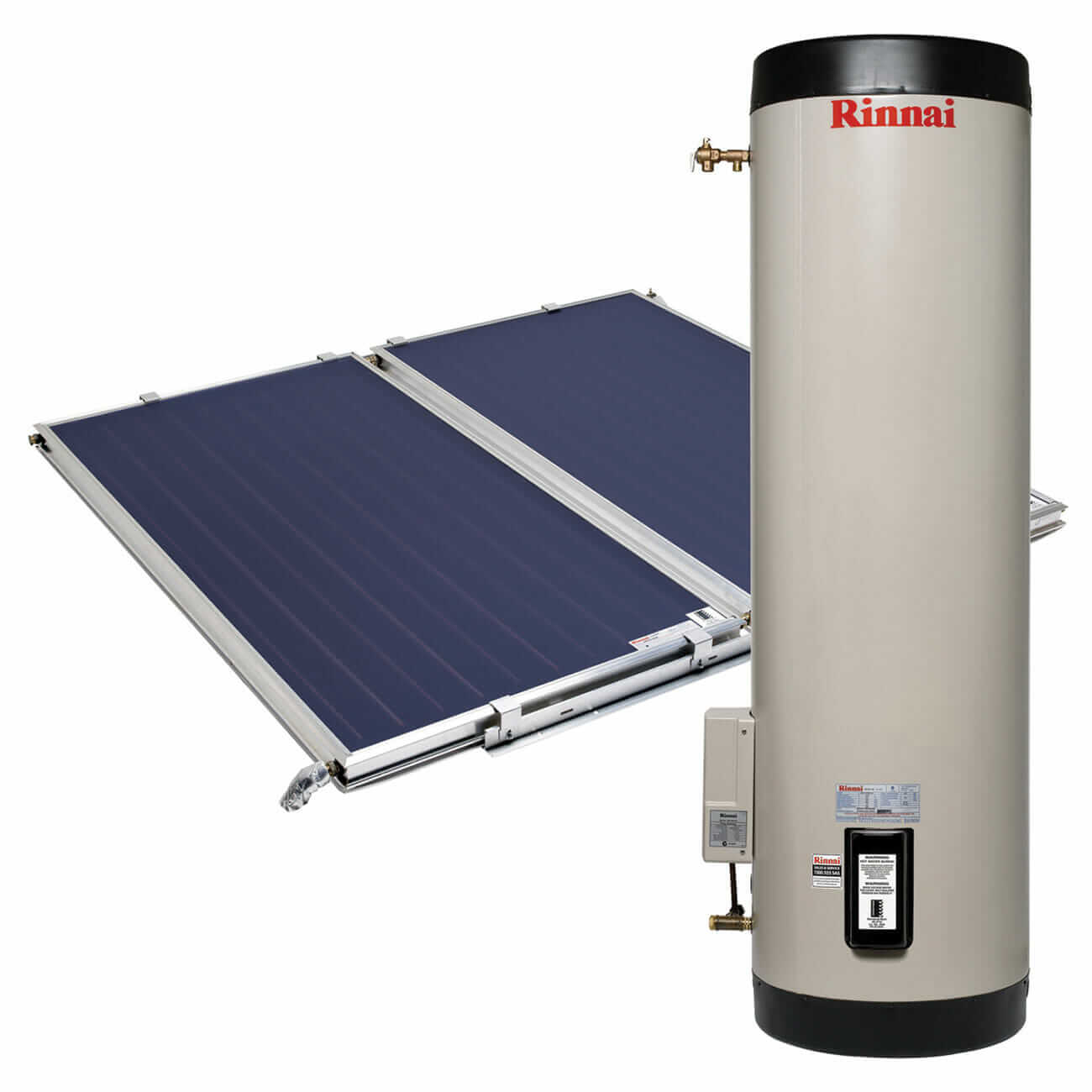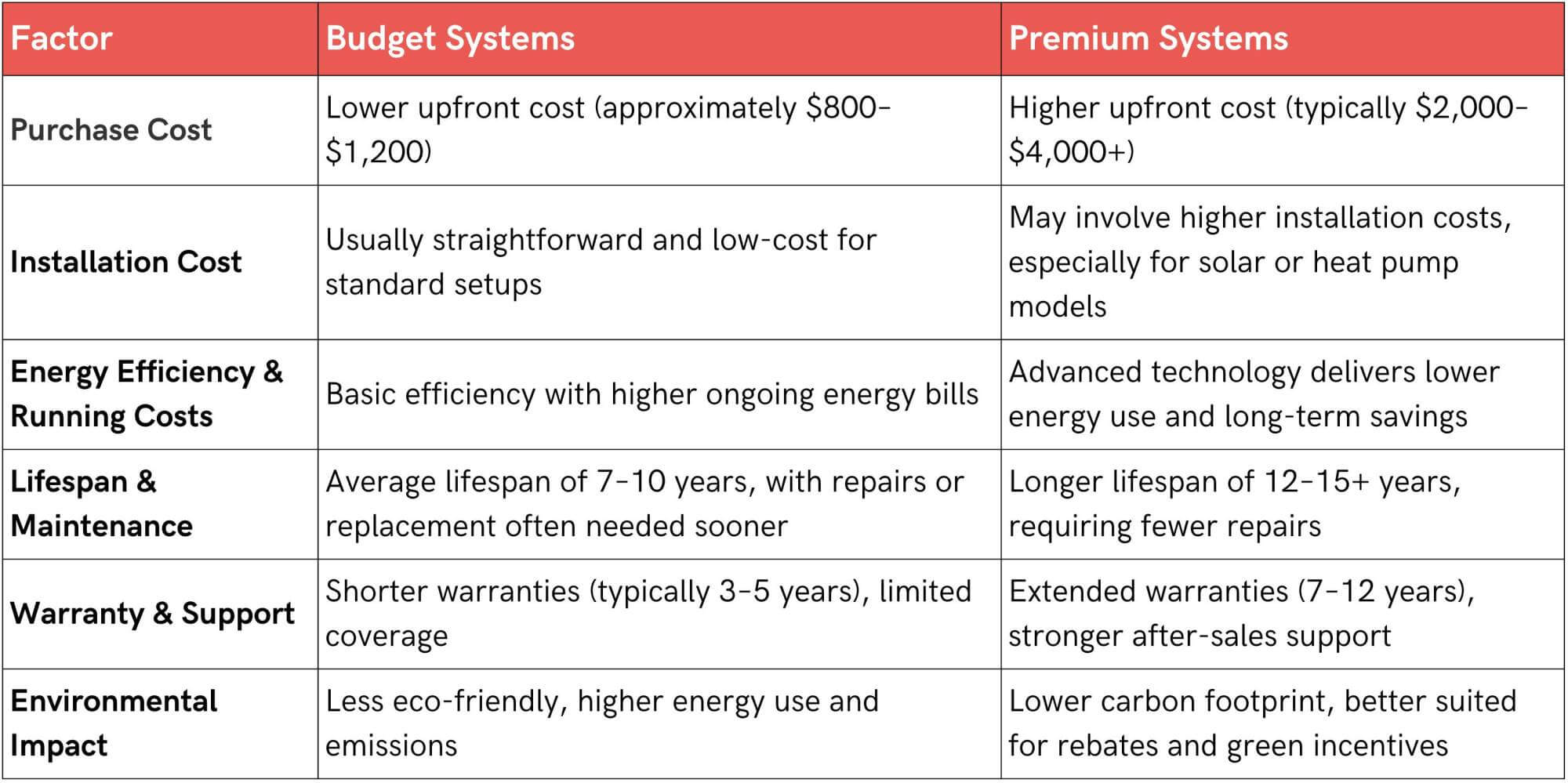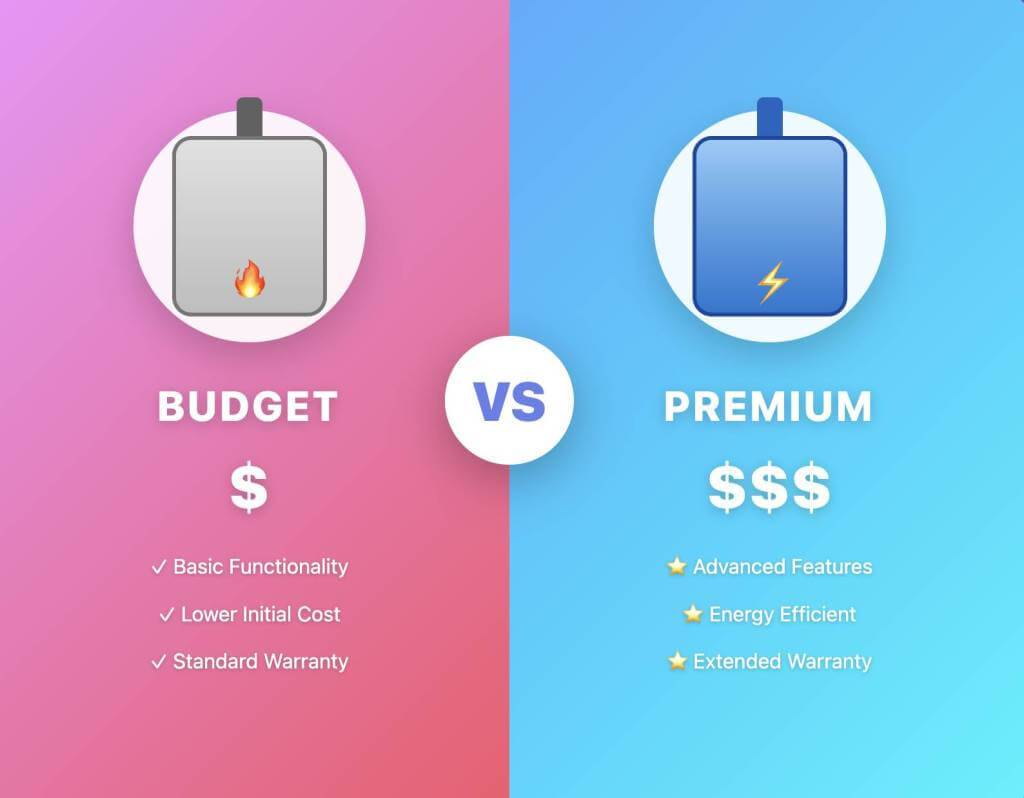Before you commit to the cheapest hot water system on the shelf, or splurge on the priciest one, you need to know the truth: Is that premium price tag actually buying you better performance, lower bills, or does it just have a fancy name?
The decision between a budget and a premium hot water system isn’t just about the upfront cost; it’s about years of potential savings, reliability, and comfort.
We’re here to break down the differences between budget and premium systems so you can make a well-informed decision. We’ll look at the major system types available (electric, gas, solar, and heat pump) and explain how the type you choose represents not just the upfront cost but also long-term value.
Different Types of Hot Water Systems
Before we start talking brands and costs, it’s worth understanding the different types of hot water systems available. Each has its own advantages, running costs, and suitability depending on your household needs.
Gas Hot Water Systems
These are the traditional systems that use either natural gas or LPG to heat water quickly. Despite being the traditional system, they’re still ideal for homes with high hot water demand and generally have lower running costs in areas with affordable gas. However, installation requires proper ventilation and gas connections, and they’re not the most energy-efficient option.
Electric Hot Water Systems
Traditional electric systems heat water using, you guessed it, electricity. Electric systems are easy to install, require minimal maintenance, and are widely available. On the downside, the running costs can be higher than gas or solar energy-efficient alternatives, especially during peak electricity times.
Heat Pump Systems
Heat pump systems are a unique technology that extract heat from the surrounding air to heat water efficiently. Hot water heat pumps use significantly less energy than standard electric systems and are ideal for environmentally conscious households. However, a heat pump’s performance can be influenced by ambient temperature, potentially reducing efficiency in very cold climates.
Solar Hot Water Systems

Solar systems use roof-mounted solar panels to capture the sun’s energy, often with an electric or gas booster for cloudy days or high demand. Unsurprisingly, solar power reduces running costs and carbon footprint but requires suitable roof space and may involve higher upfront installation costs.
What Defines a Budget Hot Water Brand?
Let’s start at the lower end of the market; the budget-friendly hot water systems that appeal to households looking for an affordable solution. Think of it like buying a basic model car without all the bells and whistles.
Budget systems are appealing for their low upfront price, though this initial saving doesn’t always last. They provide reliable hot water but usually come with fewer efficiency features and limited options compared to premium systems. And some people are okay with this.
Common lifespan and warranties
Generally, budget systems have a lifespan of around 7–10 years. However, their warranties are typically shorter, around the 5-year mark or less. They sometimes require replacement or more repairs sooner than premium alternatives, although not always.
Budget brands
Examples of popular budget brands in Australia include:
- Dux Proflo
- Vulcan, and some entry-level
- Rheem (entry-level models)
These brands offer no-fuss systems that get the job done but aren’t designed for maximum efficiency or longevity.
What Defines a Premium Hot Water Brand?
Let’s move on to the other end of the market: the premium hot water systems designed for households that value high performance, efficiency, and long-term reliability. Again, sticking with the car analogy, you’re paying extra for a model with all the advanced features and a smoother, more reliable ride.
While this means a higher upfront price tag, with that comes better technology, stronger energy efficiency, and durability, which pays off over time. Most of our customers view these as more of a smart long-term investment rather than just a solution.
Lifespan and warranties
You should get 12–15 years or more with the premium system. They also come with extended warranties, often 7–10 years, which gives you added peace of mind, making the extra cost worth it alone.
Premium brands
Examples of well-known premium hot water brands in Australia include:
- Bosch
- Rheem (premium models)
- Rinnai
These highly reputable brands are known not only for quality engineering designed with energy efficiency and modern living in mind, but also offer excellent customer support.
Key Factors in Budget vs. Premium Comparison
Before deciding whether premium systems are truly “worth it,” it helps to compare the two side by side.

In short, budget systems save you money upfront but may cost more to run and maintain, while premium systems demand a higher initial investment but deliver better efficiency, durability, and support over the long haul.
Cost vs. Value: When Is Premium Worth It?
When studying the above chart, it’s important to weigh up not just the upfront cost, but the long-term value a hot water system provides.
Do you plan to stay in your property long-term? If so, then premium systems often make financial sense. Additionally, the same goes for households with high daily hot water usage. Energy efficiency, reliability, and durability all help lower running costs and reduce repair frequency over time. And we’re talking a longer lifespan and consistent performance, which might help justify the higher upfront investment.
On the other hand, you may be looking for a solution for your rental or short-term accommodation property. In that case, a no-frills system can deliver reliable hot water without breaking the bank.
The Real Cost of ‘Saving Money’ on Budget Systems
We’re not here to convince you to spend more than you need, but after more than 30 years as professional installers, we’ve seen firsthand the reality of choosing budget systems.
Higher Running Costs
While the upfront price is lower, budget systems often lack efficiency features. This means they use more electricity or gas over time, which can add up on your energy bills. Compare this with installing a heat pump unit or solar panel system, where the energy-efficient products pay off in the long run.
Frequent Breakdowns
Budget systems are more prone to faults and repairs. Components may wear faster, leaving you calling a plumber more often than you’d like. Some customers end up spending more on repairs than the cost of a new system.
Shorter Lifespan
These systems typically last 7–10 years, compared to 12–15+ years for premium alternatives, meaning you may spend more money on the storage tank replacement in the long run.
Expert Tips for Choosing the Right System
Okay, it’s time to make a choice. Here’s our expert advice for selecting the right hot water system for your home:
Match System Size to Household Demand

Choose a system that can meet your family’s daily hot water needs without constantly running at full capacity, which can increase wear and energy use. For example, a gas brand will make more sense for a high-demand household than a heat pump hot water system.
Factor in Energy Tariffs and Rebates
Consider off-peak electricity, gas prices, and available government rebates. These can significantly affect running costs and overall value. You can find more information on the rebates available in our post on hot water rebates.
Include Installation Costs and Energy Source
Installation isn’t free, so factor this into your budget, and think about what energy sources (electricity, gas, solar) are already available at your property. Is it greenhouse gas emissions and energy consumption that you care about? Then, you might want to consider heat pump systems or solar PV units.
Consider Long-Term Costs
Look beyond upfront costs: maintenance, potential breakdowns, and replacement timelines all impact the true cost of ownership. If you believe you are in your forever home, then consider the long term investment of heat pump technology or a solar hot water storage tank.
The Final Verdict: Is the Extra Cost Justified?
Hopefully, we’ve conveyed that choosing the right hot water system isn’t just about the initial price tag; it’s about aligning your choice with your household’s needs, energy goals, and budget.
To recap, budget systems offer lower upfront costs but can lead to higher running expenses and more frequent repairs. Conversely, while premium systems require a larger initial investment, they provide greater energy efficiency, longer lifespan, and better long-term value.
Ultimately, the best choice depends on your specific circumstances. Consider factors like:
- Household size
- Energy tariffs
- Available rebates
- How long you plan to stay in your home
To make an informed decision, we recommend obtaining quotes from licensed installers who can assess your home’s unique requirements and provide tailored advice. For more information on different types of hot water systems and to request a quote, visit Same Day Hot Water Service.
FAQs
What brand of hot water system is most reliable in Australia?
Premium brands like Bosch, Rheem, and Rinnai are widely recognised for reliability, energy savings, and consistent heat energy delivery.
What is the most cost-effective hot water system?
The most cost-effective system balances upfront costs with long-term savings on electricity bills or gas systems, often favouring energy-efficient models.
What brand of hot water heater is the most reliable?
Brands such as Rheem, Bosch, and Rinnai provide dependable hot water heaters that maximise energy savings and minimise unexpected costs.
How much does it cost to replace a hot water system in Australia?
Replacement costs vary depending on system type, size, and installation, but investing in an energy-efficient unit can lower ongoing electricity bills or gas system costs.



